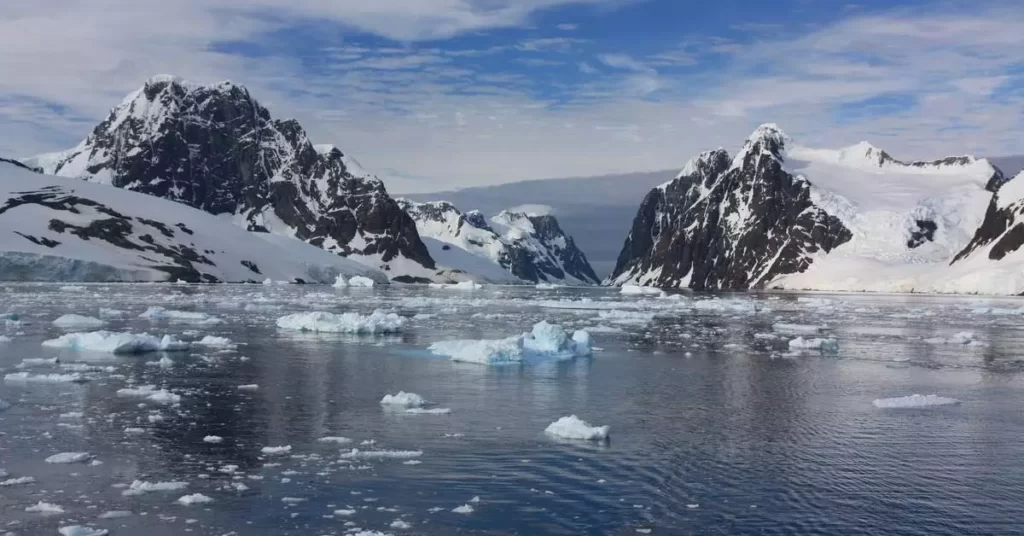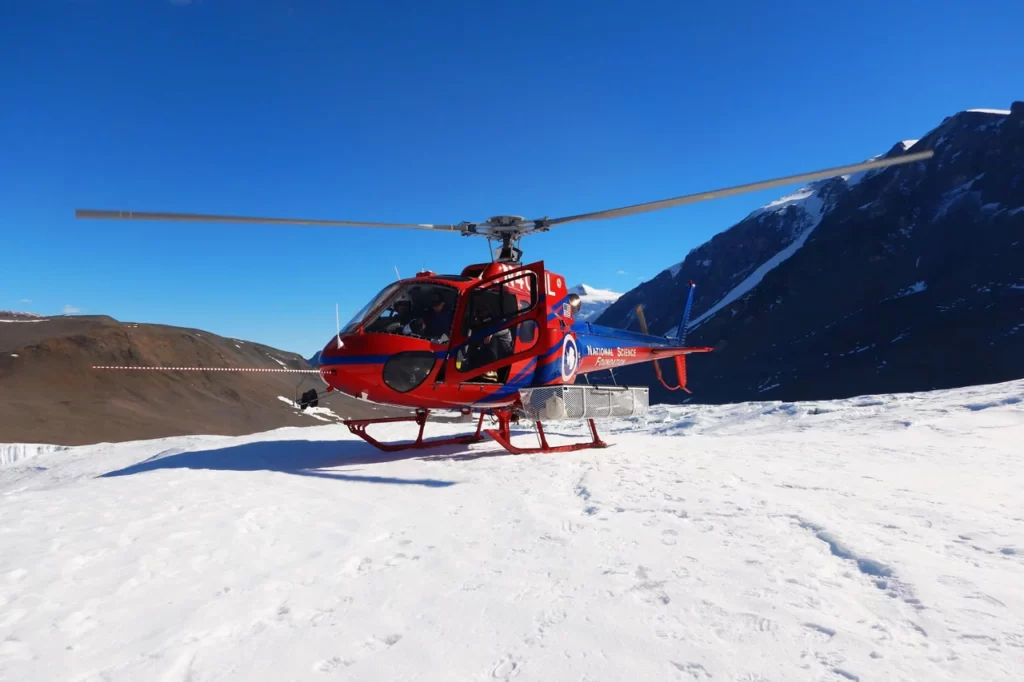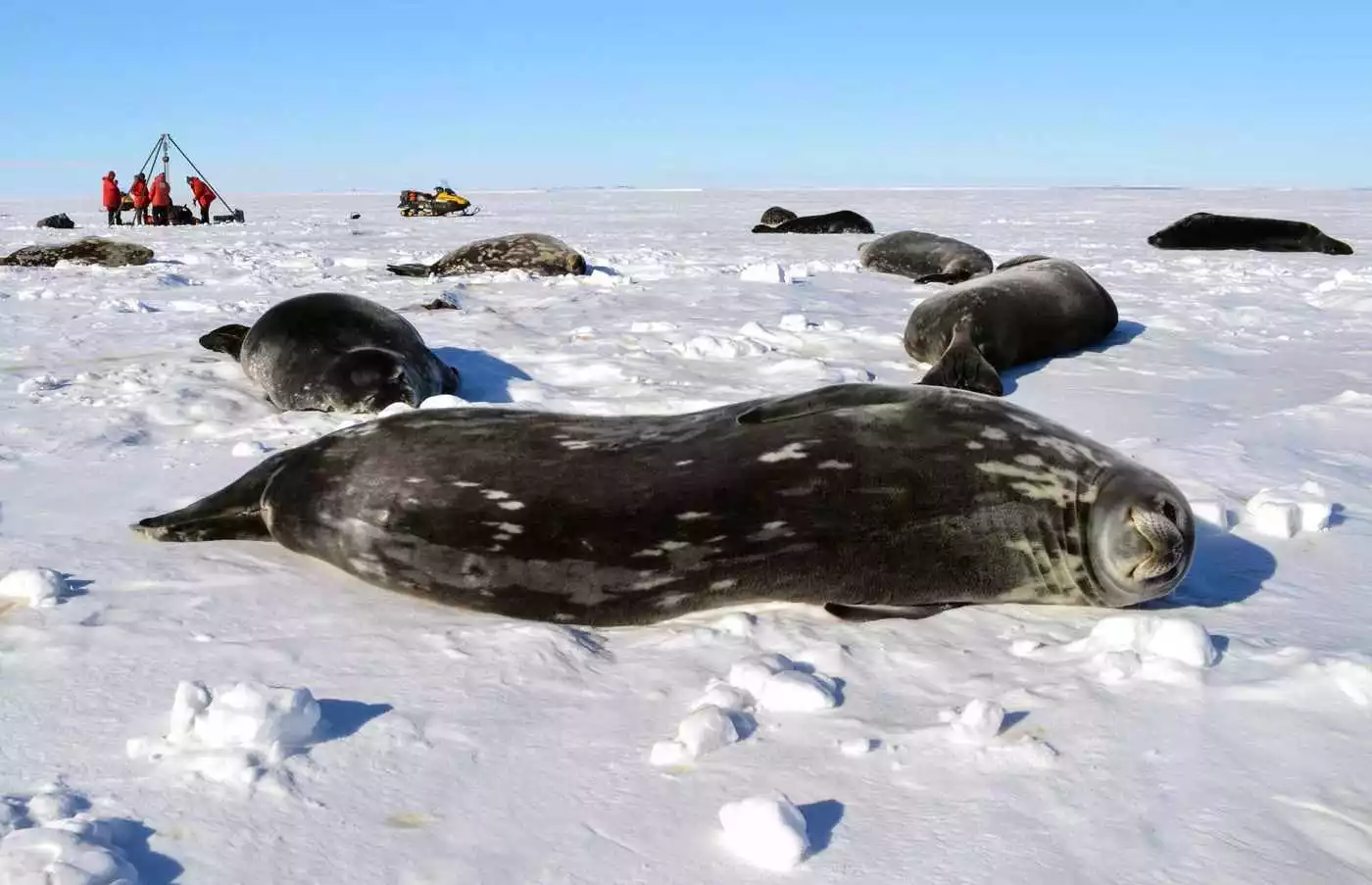Antarctic Research Faces an Uncertain Future: Challenges and Consequences for Scientists
The U.S. Antarctic research program is facing significant challenges, as canceled field seasons are affecting data collection and causing frustration among researchers. These challenges are primarily due to a combination of factors, including the COVID-19 pandemic, limited accommodations, and rising logistical costs.

Many researchers who were expecting field seasons in Antarctica have had their plans canceled or curtailed. For example, marine biologist Michelle Shero had received a grant to study Weddell seals in McMurdo Sound but had her field season canceled due to a shortage of accommodations. This situation is not unique, as the National Science Foundation (NSF) had to cancel or curtail more than half of the funded projects for the 2023–24 austral summer because it couldn’t provide necessary logistical support.
The COVID-19 pandemic played a significant role in disrupting Antarctic research, leading to the shutdown of research activities for two years and causing disruptions in the subsequent season. Additionally, a renovation project at McMurdo Station has reduced available accommodations, exacerbating the housing shortage.
Rising costs associated with providing logistical support have forced NSF to reduce the scope and duration of approved projects. This situation is posing a significant risk to the work of Antarctic scientists who rely on these field seasons to collect critical data.
The challenges faced by the U.S. Antarctic research program highlight the complex and interconnected nature of conducting research in extreme environments, and they underscore the need for continued support and investment in Antarctic science.
The challenges and uncertainties surrounding the U.S. Antarctic research program have led to concerns among scientists, particularly in light of the changing Antarctic ecosystem due to climate change.
Marine biologist Jennifer Burns, who has experience with NSF Antarctic grants, notes that something has changed in the program. While getting NSF grants for Antarctic research used to be the hard part, the recent disruptions and cancellations have raised doubts about building a career around research in Antarctica.
Meanwhile, climate change is dramatically impacting the Antarctic ecosystem and the Southern Ocean, making research in the region more critical than ever. Other nations are increasing their Antarctic research efforts to better understand these changes. In contrast, the U.S. government’s apparent retreat from Antarctic research raises concerns about its ability to contribute to our understanding of climate change and its effects.
The situation highlights the importance of addressing the logistical and operational challenges faced by the U.S. Antarctic research program to ensure that scientists can continue their essential work in this vital region.
Challenges and Priorities in Antarctica’s Scientific Research
The United States boasts the largest presence in Antarctica, primarily supporting scientific research through the National Science Foundation’s (NSF) Office of Polar Programs (OPP). McMurdo, the largest of the three U.S. research stations, serves as the central hub of operations for the U.S. Antarctic Program (USAP) and can host up to 1,200 individuals during the summer season. In contrast, the next-largest station on the continent, the United Kingdom’s Rothera Station, accommodates only a fraction of McMurdo’s population.

The NSF plays a pivotal role in facilitating various research and educational endeavors in Antarctica, spanning topics ranging from climate change to astrophysics. Researchers often emphasize that the unique conditions in Antarctica are essential for their work and cannot be replicated elsewhere. This underscores the rationale behind NSF’s funding decisions for Antarctic projects.
However, supporting scientific activities in this remote and demanding environment presents significant logistical challenges. James Ulvestad, the acting head of OPP, acknowledges these logistical hurdles and the ever-increasing demand from scientists for research opportunities in Antarctica. Once NSF approves a research proposal, private contractors, such as Leidos, manage the logistics required to execute the project.
For example, researchers like Shero, who studies seals, rely on helicopters or snowmobiles to commute from McMurdo to their research sites. These teams require specialized equipment, helicopters for tracking tagged seals, and other resources to complete their research, usually during the austral summer season.
Unfortunately, researchers and logistical support personnel face a growing shortage of accommodation facilities in Antarctica. NSF initiated a renovation project at McMurdo, including the construction of a new dormitory. However, delays caused by the COVID-19 pandemic pushed back the completion date of the new housing, impacting the 2025–26 season.
ALSO READ: Shocking Revelation – Dark Secrets Behind Elon Musk’s Neuralink Monkeys Experiment Exposed
The shortage of beds not only affects the number of researchers but also the essential support staff, such as pilots, cooks, mechanics, IT technicians, and construction workers. Moreover, NSF had to allocate 50 beds at McMurdo for COVID-19 patients, further exacerbating the shortage. Palmer Station, a much smaller research facility, will also have limited bed availability due to a heating repair project.
Additionally, rising costs have constrained NSF’s budget for transporting personnel and cargo to and from Antarctica. The hourly rates for LC-130 planes, which can land on ice, have tripled since 2017, and the aging aircraft require more frequent repairs. C-17 transport planes, which deliver equipment, have also experienced delays.
Helicopter support for researchers working on sea ice or in remote locations will cease early, three months earlier than usual. Researchers relying on a 6-week annual cruise from Palmer Station have been informed that it may become a biennial event.
Despite these challenges, NSF remains committed to funding high-quality Antarctic research. However, the flat OPP budget has limited the agency’s ability to increase support levels for researchers, resulting in impacts on their projects and fieldwork. Researchers are advised to adapt to these changes while NSF continues to prioritize exceptional scientific endeavors.
Antarctic Research Faces Setbacks Amidst Funding Cuts and Delays
The recent cuts and postponements are inevitably taking their toll on scientific research in Antarctica, particularly affecting projects that rely on continuous data sets or precisely timed observations. Among the casualties are the two Antarctic Long-Term Ecological Research (LTER) projects, which have been running for over three decades. These projects are vital for monitoring the vulnerable and rapidly changing Antarctic ecosystem. However, the size of the teams involved in these projects is being significantly reduced, with their field seasons drastically shortened.

For instance, scientists affiliated with the McMurdo Dry Valleys LTER project, funded by NSF since 1992, will only have access to 10 beds this fall, a stark contrast to their usual complement of 31. Due to reduced helicopter availability, scientists will be deployed for a much shorter field season, as brief as 3 weeks in November, compared to the typical 4-month duration. This means that fewer data will be collected, and certain aspects of the research will be omitted.
While researchers appreciate NSF’s long-term support, they feel that their projects have not been prioritized. Project director Michael Gooseff, an environmental engineer at the University of Colorado Boulder, acknowledges the challenges and states that although they will still have a team in the field this season when other science groups have been canceled, the cuts are significant.
ALSO READ: Boosting NASA’s UFO Investigations: The Case for Increased Budget Allocation
Dawn Sumner, a paleo geobiologist at the University of California, Davis, has experienced even more significant setbacks, as her entire field season has been canceled. Her research involves studying seasonal changes in microbial communities at the bottom of ice-covered Lake Fryxell in the Dry Valleys. The disruption caused by the cancellation has raised challenges, particularly concerning the timing of her experiments.
Sumner’s team had installed shades over some microbial mats during the previous field season to observe metabolic changes over the Antarctic winter and into spring. However, with this field season’s cancellation, they will have only 6 days to retrieve instruments installed the previous year, effectively requiring them to start over.
Natasja van Gestel, a biologist at Texas Tech, faced a different hurdle. NSF requested that she spend a longer period tracking the impact of global warming on organisms living on the western Antarctic Peninsula. Her team had installed open-top chambers over vegetation to simulate climate warming’s effects on carbon flux. NSF asked her to arrive in Antarctica six weeks earlier and stay until April to avoid peak demand for transportation to Palmer Station. However, this was unfeasible for van Gestel due to her university teaching commitments.
NSF has requested contractors to leave the warming chambers in place at the end of the season for the following year. While van Gestel appreciates this support, the inability to collect data during the extended period is a significant challenge. Moreover, the specialized nature of the measurements requires special training, making data collection in the following year challenging. Any setbacks or issues could potentially necessitate restarting the experiment, assuming the team can be deployed for the 2024–25 season.
Challenges Mount for Antarctic Scientific Research
Recent disruptions in Antarctica have raised concerns about the future of scientific research in the region and its attractiveness as a career option. The U.S. Antarctic Program (USAP) has faced significant challenges due to budget cuts and logistical difficulties in recent years.
During the 1990s and into the 2010s, USAP had robust logistical support and contingency plans in place for handling unexpected challenges. However, the program has lost its resilience, leading to concerns among researchers. Many experienced personnel working for USAP’s contractor, Leidos, and its subcontractors have not returned to Antarctica after their positions were eliminated during the early years of the COVID-19 pandemic. This shortage of experienced staff has exposed safety and equipment concerns, including the aging of research infrastructure.
ALSO READ: Powerwall 3: Redefining Solar Energy Storage and Home Power Solutions
Sea-ice scientist Shero and 30 other colleagues expressed their concerns to the National Science Foundation (NSF) about the program’s ability to support their research efforts adequately. They noted that USAP cannot continue with “business as usual” if sea-ice science is to remain safe and productive.
Researchers are facing significant disruptions to their projects. Some are receiving fewer beds and shortened field seasons, impacting data collection and research outcomes. For example, paleo geobiologist Dawn Sumner had to cancel her field season, jeopardizing the continuity of her research.
The disruptions have raised questions about NSF and Leidos’ ability to anticipate challenges caused by the pandemic, construction, and rising costs. The last-minute cancellation of the 2023–24 field seasons for many projects has left scientists frustrated and uncertain about the future. NSF has cited budget, space constraints, and the unpredictable nature of congressional budget approvals as contributing factors to the late decisions.
Some researchers are concerned about the long-term impact of these episodic interruptions on their careers and the field of Antarctic research. The discrepancy between funded projects and available research support has also frustrated scientists, potentially forcing them to shrink their projects for years to come.
While NSF is working to minimize the impact on scientists, the uncertainty surrounding future fieldwork and logistical challenges in Antarctica continues to cast a shadow over the Antarctic research community.









